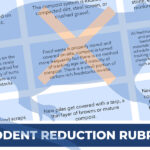Top: Photo courtesy of Recology
The Natural Resources Conservation Service (NRCS), part of the U.S. Department of Agriculture, created Soil Carbon Amendment Code 336 in 2022 as part of its Conservation Practice Standards. The standard covers application of carbon-based amendments derived from plant materials or treated animal by-products, including compost and biochar. Inclusion of compost application as a qualified NRCS Conservation Practice Standard began in California in 2015, with formal field trials that tracked effects of a half-inch application of compost on rangelands across the state, explains an article in the US Composting Council’s (USCC) June Compost Communicator. Following these trials in California, NRCS added compost as Interim Practice 808. “This enabled further testing of compost on farm and rangeland and added compost to a number of other Conservation Practices for which farmers and ranches can apply for federal financial assistance, such as no-till and crop rotation,” notes the Communicator article. “Over the course of 2021, 10 other states added it as an interim practice. At the national level, USDA held a public comment period for Interim Practice 808 in 2020-21 to prepare for eligibility as a national reimbursement program. USDA then modified the original 808 Interim Practice as the new Conservation Standard Practice (CSP) Code 336 standard.”
The next step in the process is for states to adopt CSP 336 so more compost can be considered in conservation planning and made eligible for reimbursement through NRCS conservation programs, says Frank Franciosi, USCC’s Executive Director. “We need everyone’s help to encourage your state conservationists to adopt 336 and encourage the opening of state-level Conservation Innovation Grants to refine technical guidance and increase knowledge and understanding of compost use on working lands. State NRCS offices are considering making a Conservation Innovation Grant federal funding request at this very moment.” The USCC created the NRCS Code 336 Resource Hub that includes a link to identify states that have adopted the new standard, as well as suggested text for letters to send to state conservationists.










